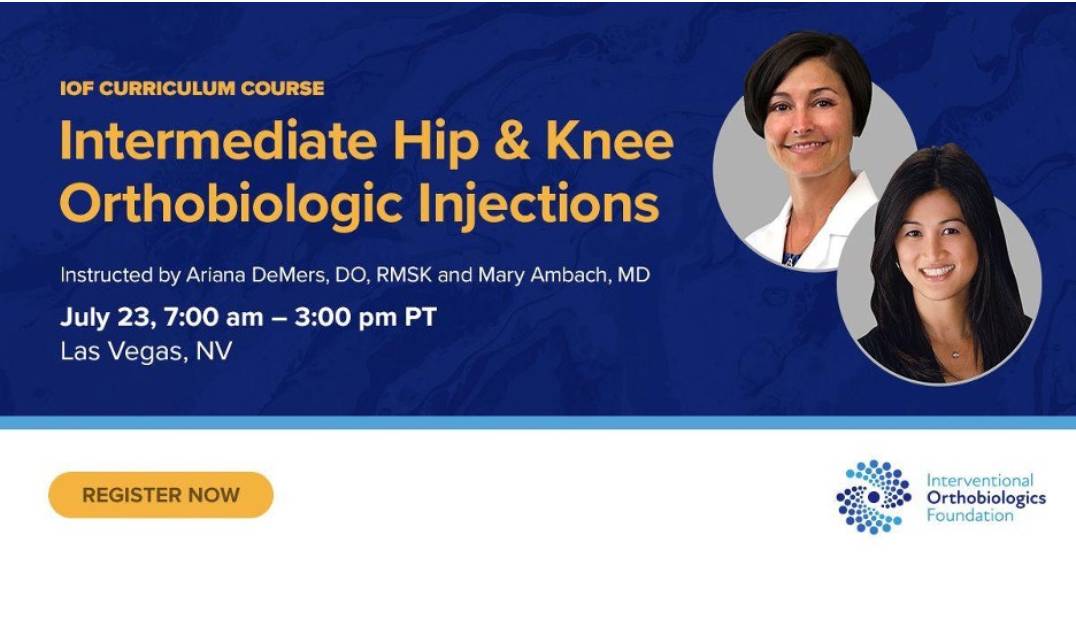Join us in Las Vegas to learn orthobiologic injection techniques for hip & knee
IOF is headed to Sin City in just a few weeks for our Intermediate Hip & Knee Orthobiologic Injections Course.
During this one-day course, attendees will have the opportunity to advance their knowledge of orthobiologics and injection techniques for the hip and knee under ultrasound and fluoroscopy. This course will be led by IOF expert instructors Ariana DeMers, DO, RMSK and Mary Ambach, MD.
- July 23 – 7:00 a.m. – 3:00 p.m. PT
- Regenexx Las Vegas
100 N. Green Valley Parkway Suite 325
Henderson, Nevada 89074 - Register here to attend: https://bit.ly/3qvR0IS
Frequently asked questions about our orthobiologics for orthopedics course
What can I expect to take away from this course?
This course is your chance to learn clinical pearls from skilled, experienced instructors. We will cover different approaches to performing joint and specific tendon and ligamentous tissue injections using ultrasound and fluoro in the knee and hip. You will also master the detailed anatomical imaging and pathology relevant to the performance of orthobiologic procedures.
After completion of this course, you will be able to confidently evaluate and treat the most common lower extremity complaints. You will leave the course with the following skills and knowledge:
- Hip and knee ultrasound evaluation
- Intraarticular ultrasound guided injections of the hip and knee
- Posterior hip tendon understanding
Who is this course for? Any specific skills I should brush up on before the course?
Practitioners with the appropriate orthopedic specialty and training who would like to learn important new skills or improve their techniques in orthobiologic injections in the hip and knee should attend this course. This course is for physicians ( MD or DO) with a musculoskeletal specialty:
- Physical Medicine and Rehabilitation
- Family Practice with the completion of a Sports Fellowship
- Interventional Spine (Anesthesiology or PMR)
- Orthopedic Surgery
- Interventional Radiology accepted only with significant hands-on examination experience.
We recommend that attendees conduct an in-depth review of the knee and hip anatomy before the course, after all, ultrasound is just evaluating anatomy in real time. This course is NOT a basic ultrasound course. Attendees must have a basic understanding of orthobiologics and ultrasound diagnostics for this course.
If you are looking for a more comprehensive overview of ultrasound diagnostics while you are in Las Vegas, be sure to check out OrthoSono’s Regenerative Medicine and MSK Ultrasound Course, which will be held July 20-23 at the Planet Hollywood Resort and Casino.
What sets this IOF course apart from other courses I could find elsewhere? Why should I come to IOF for this training?
IOF is the only organization to offer a comprehensive, structured curriculum in interventional biologics. When you come to an IOF course, you can be confident that you will learn from experienced, well trained instructors using a well established curriculum. You can also be confident that you will get the intimate instruction that you need to master the technique. We offer a small group setting that provides ample time for learning and instruction.
The opportunity to learn continues after the course. You will receive procedure-specific instructional videos that you can pull up at any time to review the procedure before treating a patient.
Why do the instructors like teaching this course? Why is training on these techniques important?
IOF instructors love teaching our courses because they are such a deep dive into the anatomy and the learner will be equipped to elevate their skills to the next level on the way to mastery. Our instructors know that attendees will gain valuable, useful knowledge and skills that they can apply to their patients and practices. Our instructors love knowing that when practitioners learn how to perform these procedures accurately and safely for the ultimate benefit of the patients.
Knowledge of the posterior hip tendons are a game changer for pinpointing causes of posterior hip pain, instead of always blaming it all on the piriformis.

